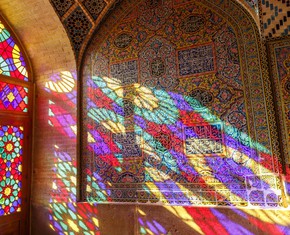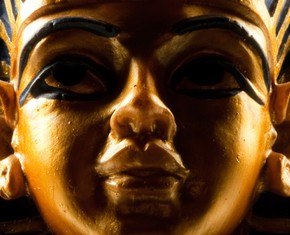The views expressed in our content reflect individual perspectives and do not represent the authoritative views of the Baha'i Faith.
The Baha’i Faith had its initial origins in Persia in 1844, when a revolutionary departure from Islam called the Babi Faith emerged.
Growing out of mystical Sufi traditions, the Babi Faith [pronounced “Bob-ee”] was named after its founder, known as The Bab, a title that means The Gate. The Bab, a young merchant and mystic whose name was Siyyid Ali Muhammad, promulgated a newly-revealed religion that challenged the status quo in nineteenth-century Persia and served as the precursor and progenitor of the Baha’i Faith.
From its beginnings in 1844, the Babi religion threatened and enraged the Muslim clergy and the Persian government—because it proclaimed that religion must be regenerated from time to time, and that the time had come for its renewal. The physical seasons must change—our lives depend on it. The Bab taught that our spiritual lives also depend on change and growth. Eventually, winter ends and new life awakens and pushes through the stagnant earth, especially in religion:
The divine Prophets are as the coming of spring, each renewing and quickening the teachings of the Prophet Who came before Him. Just as all seasons of spring are essentially one as to newness of life, vernal showers and beauty, so the essence of the mission and accomplishment of all the Prophets is one and the same. Now the people of religion have lost sight of the essential reality of the spiritual springtime. They have held tenaciously to ancestral forms and imitations, and because of this there is variance, strife and altercation among them. – Abdu’l-Baha, The Promulgation of Universal Peace, p. 125.
The Babis believed that the time had come for a spiritual awakening, that new, progressive religious ideas must push aside outdated dogma. In a society steeped in the belief that Muhammad was the last of all prophets, and that Islam was the final and greatest of all religions, this was blasphemy, apostasy, and a heinous crime. In Persia in the mid-1800s, there was no such thing as religious freedom.
During this tumultuous period in Persia, tens of thousands of people became followers of The Bab. But the harsh reaction from the powerful clerical establishment and the government resulted in torture, prison and death for approximately twenty thousand Babis. Despite this, Baha’u’llah and his companions fearlessly proclaimed their Faith, and willingly went to prison for it, even though they had committed no crime.
Baha’u’llah’s wife Navvab learned of her husband’s first arrest when a servant suddenly rushed into her presence in great distress. “He is arrested!—I have seen him!” the servant cried. “He has walked many miles! O they have beaten him! … His feet are bleeding! … There are chains upon his neck.” – as recounted by Lady Blomfield in The Chosen Highway, pp. 40-41.
Soon, everyone knew of Baha’u’llah’s arrest and the family home was ransacked by mobs. Navvab gathered what she could and escaped with her children into hiding. She knew very well that Babi women and children had been murdered by mobs many times before.
For many years she and her husband had worked side by side to help the destitute–in fact, Baha’u’llah had long been known in Persia as “the Father of the Poor.” Now, she and her children had instantly become homeless themselves. To purchase food for the children, she sold some gold buttons from her clothing. At times she had nothing to offer her children to eat but a bit of dry flour that she poured into the palms of their hands. Despite their own dangerous situation, the family’s greatest anxiety centered on Baha’u’llah: Was he alive? Was he being tortured?
After a few days the family learned where the authorities had imprisoned Baha’u’llah–the infamous Siyah-Chal, the “Black Pit” of Tehran:
He was imprisoned in an underground dungeon, where the light of day was never seen. A heavy chain was placed about his neck by which he was chained to five other Babis; these fetters were locked together by strong, very heavy bolts, and screws. His clothes were torn to pieces, also his fez. In this terrible condition he was kept for four months. – Abdu’l-Baha, Paris Talks, p. 75.
Baha’u’llah’s oldest son Abbas, later known as Abdu’l-Baha, then eight years old, could not be held back. He loved his father intensely, and had to see him. He persuaded a servant who worked for the family to take him to see his father. The servant took the boy to the prison and carried him on his shoulders down the stairs into the pit. As they descended into the darkness, they could see nothing. Suddenly, they heard the voice of Baha’u’llah command, “Do not bring him!”
Immediately, they turned around and walked back out. Abdu’l-Baha then learned from the guards that the prisoners would emerge briefly at noon for their meal. He waited until noon when, filthy and ragged, guards brought the men out of the pit. Then he saw his father: bent over from the chains, his neck bruised and swollen from a heavy steel collar, clothes tattered, hair and beard disheveled, his face pale and gaunt. At some point during his imprisonment, Baha’u’llah had been poisoned and his appearance dramatically showed its effects. The child fainted from the shock. He had to be carried away.
Abdu’l-Baha’s own words about Baha’u’llah’s cruel captivity—which later became a forty-year odyssey of exile to other countries and continuous confinement—describe what he began to understand on that terrible day:
Because He suffered imprisonment, we are free to proclaim the oneness of the world of humanity for which He stood so long and faithfully. He was chained in dungeons, He was without food, His companions were thieves and criminals, He was subjected to every kind of abuse and infliction, but throughout it all He never ceased to proclaim the reality of the Word of God and the oneness of humanity. – Abdu’l-Baha, The Promulgation of Universal Peace, pp. 6-7.
















Comments
Sign in or create an account
Continue with Googleor